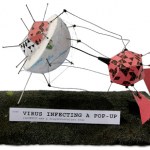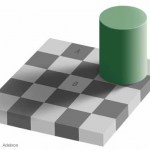Science in Culture & Policy
I have a copy of "Alternative Careers in Science: Leaving the Ivory Tower" (1998 edition) that I'll mail to the first person who emails me their (US) address. Sorry, It's taken!
I can think of a few answers, but the Name Inspector points out that naming food is one: apparently the Corn Refiners Association is trying to rename "high fructose corn syrup" "corn sugar."
it's gotten an especially bad rap lately, partly because it has a name so long and scientific sounding that it has to be abbreviated.
First off, I don't think "high fructose corn syrup" is all that "scientific sounding"; try "monosodium glutamate" on for size and get back to me. It's also not that long: six syllables, people! But the interesting issue is that the aura of high-tech innovation and space-…
Christopher Reiger has a great post at Hungry Hyaena about public communication strategies used by scientific advocacy groups, and where artists should adopt similar strategies:
Most Americans see science as extraneous esoterica crafted by white-coated wonks. Similarly, contemporary art is seen as the province of effete Onanists devoid of "family values." But the respective responses of the two realms to these ugly public perceptions is critically different. The scientific community has confronted the issue head-on, spilling ink, hosting panel discussions, and building programs. Whether or…
"You'd think that art is based more on intuition and science is based more on knowledge and fact, but what I think happens is that as you get more proficient in either of those fields, the intuitive knowledge base and the factual knowledge base become equally important. In this sense, Einstein may have been an artist because he used an intuitive sense of how things worked."
Yo-ichiro Hakomori, biochem BA & architect
wHY Architecture & Design
source
For everyone frustrated with the unscientific, spotty, incoherent and often inaccurate coverage of the Japanese nuclear plant situation: one geo-blogger and her dad try to help out. Now THAT is how you use your scientific expertise to improve public understanding in a meaningful, immediate way. Bravo, georneys!
On Wednesday, I gave a breakout session talk on science policy jobs at MIT. I love talking about science policy, so it's not too hard to get me to do it - it's harder to get me to stop - and we had a great group of Boston-area grad students who asked excellent questions. Very fun.
The talk did force me to reflect on how different things are in my life since I left the bench. I'm certainly working no fewer hours (apparently Scienceblogs has been experiencing a denial of service attack this week, and I did not even notice. Bad sign). I still often have to do things I don't particularly enjoy,…
Okay, I knew that planets are big, intellectually, but a well-done graphic is worth a thousand words, and a pretty HD video is even better. Brad Goodspeed made this video to suggest what other planets would look like, if they orbited Earth at the same distance as the Moon does. I've embedded it, but you should seriously watch it in HD, full-screen for maximum effect.
Scale from Brad Goodspeed on Vimeo.
I have nightmares like that. Seriously. But is the video accurate?
In addition to being full-on creepy, Brad's video produced a fascinating discussion in the comments and on various sites…
Remember the synthetic biology documentary I blogged about a while back? Well, the filmmakers are still working toward their goal. They have a little less than a month left, and I just noticed that they've seriously beefed up the rewards you can get for funding them. There are some interesting gifts from $10 up, but now at $300$1000*, they will send you a rough cut, solicit your input, and credit you in the final version. For everyone concerned about how scientists appear in the film, this is an intriguing option!
*Correction -the cost is actually $1000. For some reason Kickstarter bins all…
I think DNA is amazing. I think biotech inspires great design. And if you've read this blog at all, you know I love sciart. But I just cannot understand the new infogenetics product from DNA 11 - the company behind that trendy gel electrophoresis wall art. While I'd normally just say "I don't get it" and move on, DNA 11 claims that their "augmented art" is "the ultimate intersection of biology, art and technology." I don't know how that could get more squarely in the BioE wheelhouse. So let's take a closer look at how, exactly, biology and art intersect in the "Ancestry Portrait" (pictured…
From NextNature, an intriguing post about the Institute for Digital Biology:
During the exhibition, visitors were able to feed a colony of microscopical pop-up creatures, save Chinese websites from a pageview-shortage, preserve an Amazone tribe from extinction by subscribing to its homepage and view a short documentary on how the living internet established itself.
Artist Walewijn den Boer also created a peculiar, twelve-minute faux-documentary, which uses animation to bring his digital biology concepts into meatspace (check it out below the fold).
Update 1:
I think the clunkiness of the…
I got a very nice email today from Sam Gaty, one of the filmmakers behind the Synthetic Biology Documentary I blogged about earlier. He acknowledged the "mad scientist" type concerns, but emphasized that's not what they're going for in the final documentary, and suggested I share another short clip. This one is far more, I don't know how to describe it, techno-chic?
I can definitely see that sort of presentation getting kids interested in biology. It spins bench science as something intriguing, cutting edge, maybe a little hipster. Framing really is all in the aesthetics, isn't it?
Check…
So I'm all in favor of promoting struggling artists, and that includes documentary filmmakers. But I have to say I'm a little taken aback by the aesthetic of the "Synthetic Bio" documentary project by Field Test Films (and endorsed by Carl Zimmer). They've posted a short over at Kickstarter, where they're trying to raise $30K to finish the film in time for Sundance. But as one of my biologist friends pointed out, the soundtrack they use for the sample short (on producing spider silk in goat's milk) is eerie, mad-scientist stuff, complete with a Exorcist-like choir at the end.
I'm posting the…
Psychologist Robert Kurzban's new book promises to explain Why Everyone (Else) Is a Hypocrite. It's a bold promise, and I was skeptical when first invited to review it. But Kurzban delivered - hilariously, entertainingly so. Although since I agree with almost everything he writes, I may not be the most objective of critics. (FYI: this is a long review, so if you're short on time, you can skip to the end of the post, and watch the author's short video trailer about the book. Cheers.)
For starters, Kurzban has convinced me to be more careful when I talk and write about my brain (and yours).…
Observatory is hosting another great event tonight:
From Heumann Heilmittel, "Eine Reise durch den menschlichen Körper" (1941)
Body Voyaging: an illustrated lecture with Kristen Ann Ehrenberger
Date: TONIGHT, Monday, January 17th
Time: 8:00 PM
Admission: $5
Presented by Morbid Anatomy
We human beings have a seemingly insatiable desire to experience the bodies underneath our skins. While many scholars have treated the subject of looking into or through bodies via medical imaging, one perhaps understudied trope is that of "body voyaging." A few writers and artists have imagined what it…
. . . from gun violence.
A new PSA campaign is based on artwork by artist Francois Robert. Via fubiz.
Here are some essay links I've had open as tabs in my browser for over a week, waiting to be posted. Unfortunately, I don't have time to do the extensive commentary they deserve, so I'm admitting that, and just posting them already. Enjoy.
Graphical Abstracts & Biologists as Designers
Andrew Sun discusses "graphical abstracts" at nature network:
Although they are irrelevant to the quality of the research in my opinion, graphical abstracts (GAs) are in fact increasingly appreciated nowadays. No matter you like them or not, chances are that you have to draw one in order to publish your…
This video from the University of Minnesota's Institute on the Environment is like a conservationist's version of the "Right Here, Right Now" video about social media (although the music isn't as good). It has crisp design, good infographics, and makes a very important point: that nature has massive, unappreciated economic value.
I'm not saying that money should be the main reason for environmental protection; I value nature for purely aesthetic and scientific reasons, over and above economics (although aesthetics and science both have economic value - realized through tourism and R&D).…
Today's Guardian has a very interesting (though long) article by Richard Holmes, author of The Age of Wonder, about the unsung women of science. In the Guardian piece, Holmes shares some of his research for his forthcoming book, The Lost Women of Victorian Science:
[M]y re-examination of the Royal Society archives during this 350th birthday year has thrown new and unexpected light on the lost women of science. I have tracked down a series of letters, documents and rare publications that begin to fit together to suggest a very different network of support and understanding between the sexes.…
Hannah Waters at Culturing Science has written a lovely little post on the day-to-day benefits of having a scientific worldview:
I grew up immersed in science. Any facts that exist that I couldn't reconcile with experience, I just chalked up to the limitations of my senses or even my brain's ability to conceptualize (the latter usually reserved for when I'm dealing with astrophysics). But if you aren't well-versed in how science works and perhaps the basics, this stuff sounds completely insane!
Read more here. While I'm not quite as optimistic that the power of awesome, or science…
A couple of days ago, the New York Times reported on an undergraduate class at Harvard that teaches the science of cooking. It's called "Science & Cooking: From Haute Cuisine to Soft Matter Science," and it's popular: if you're a Harvard undergrad, you have about a 43% chance of winning a seat at the lab bench (still, as one of the instructors points out, better odds than most people have of getting reservations at one of the participating guest chefs' exclusive restaurants).
The class also seems to be changing the way some students think about science:
For Mr. Jean-Baptiste, a junior…




